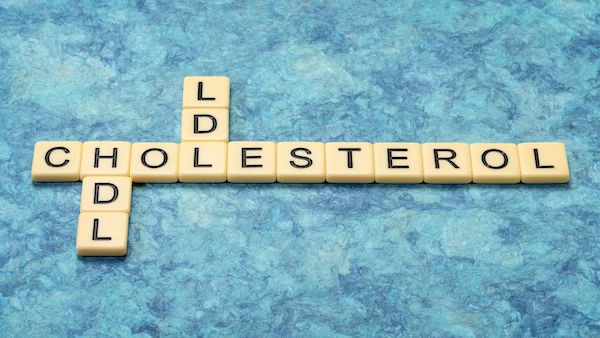Triglycerides: Levels, Ranges, and Treatments
Learn about triglycerides, including normal levels, risk ranges, and treatment options. Understand how high triglyceride levels affect your health and ways to manage them effectively.

Written by Dr. Vasanthasree Nair
Reviewed by Dr. Shaik Abdul Kalam MD (Physician)
Last updated on 25th Aug, 2025
.webp?tr=q-80,f-webp,w-350,dpr-2,c-at_max 700w)
Introduction
Triglycerides are a type of fat (lipid) found in your blood. While they are essential for providing energy to your body, high levels can increase the risk of heart disease and other health problems. If you've recently had a lipid test or been told your triglycerides are high, don’t worry, this guide will help you understand what triglycerides are, why they matter, and how to keep them in a healthy range.
What Are Triglycerides?
Triglycerides are the most common type of fat in your body. When you eat, your body converts any extra calories (especially from sugars and fats) into triglycerides, which are stored in fat cells. Later, hormones release triglycerides for energy between meals.
However, consistently high triglyceride levels can lead to hardened arteries (atherosclerosis), increasing the risk of heart disease, stroke, and pancreatitis (inflammation of the pancreas).
Consult a Top Heart Specialist for the best advice
Normal vs. High Triglyceride Levels
A simple blood test called a lipid panel measures your triglyceride levels. Here’s how the results are categorized:
- Normal: Less than 150 mg/dL
- Borderline High: 150–199 mg/dL
- High: 200–499 mg/dL
- Very High: 500 mg/dL or above
If your levels are above 200 mg/dL, your doctor may recommend lifestyle changes or medications to lower them.
Get Your Health Assessed
What Causes High Triglycerides?
Several factors contribute to high triglyceride levels, including:
- Diet: Eating too many refined carbs (white bread, sugary foods) and unhealthy fats (fried foods, processed snacks).
- Obesity: Excess weight, especially around the waist, increases triglycerides.
- Lack of Exercise: Physical inactivity slows metabolism, leading to fat buildup.
- Alcohol: Drinking too much alcohol can significantly raise triglyceride levels.
- Medical Conditions: Diabetes, hypothyroidism, kidney disease, and liver disease can affect levels.
- Genetics: Some people inherit a tendency for high triglycerides.
How Do High Triglycerides Affect Your Health?
High triglycerides often accompany other risk factors like:
- High LDL ("bad") cholesterol
- Low HDL ("good") cholesterol
- Insulin resistance or diabetes
- High blood pressure
Together, these conditions increase the risk of heart disease, stroke, and pancreatitis.
How to Lower Triglycerides Naturally
The good news? Many people can lower triglycerides through simple lifestyle changes:
1. Eat a Heart-Healthy Diet
- Reduce Sugars & Refined Carbs: Cut back on sweets, sodas, white bread, and pasta.
- Choose Healthy Fats: Eat more omega-3 fatty acids (found in fatty fish like salmon, flaxseeds, walnuts) and unsaturated fats (olive oil, avocados).
- Increase Fibre: Whole grains, fruits, vegetables, and legumes help lower triglycerides.
- Limit Alcohol: Even small amounts can raise triglycerides.
2. Exercise Regularly
- Aim for at least 30 minutes of moderate exercise (brisk walking, cycling, swimming) most days. Exercise helps burn triglycerides for energy.
3. Lose Excess Weight
- Losing even 5–10% of your body weight can significantly lower triglycerides.
4. Manage Underlying Conditions
- If you have diabetes, hypothyroidism, or high blood pressure, follow your doctor’s treatment plan.
5. Quit Smoking
- Smoking worsens cholesterol and triglyceride levels. Quitting improves heart health.
When Are Medications Needed?
If lifestyle changes aren’t enough, your doctor may prescribe:
- Statins (for high cholesterol + triglycerides)
- Fibrates (specifically for high triglycerides)
- Omega-3 supplements (prescription-strength fish oil)
Never self-medicate; always consult a doctor before starting any treatment.
When to See a Doctor?
Get tested if:
- You have a family history of high triglycerides or heart disease.
- You experience symptoms like chest pain, fatigue, or frequent pancreatitis.
- Your lipid test shows high levels.
Final Thoughts
High triglycerides are common but manageable. By making smart food choices, staying active, and working with your doctor, you can keep your levels in check and protect your heart.
Consult a Top Heart Specialist for the best advice
Consult a Top Heart Specialist for the best advice

Dr. Zulkarnain
General Physician
2 Years • MBBS, PGDM, FFM
Bengaluru
PRESTIGE SHANTHINIKETAN - SOCIETY CLINIC, Bengaluru

Dr. Anand Ravi
General Physician
2 Years • MBBS
Bengaluru
PRESTIGE SHANTHINIKETAN - SOCIETY CLINIC, Bengaluru

Dr. Tripti Deb
Cardiologist
40 Years • MBBS, MD, DM, FACC, FESC
Hyderabad
Apollo Hospitals Jubilee Hills, Hyderabad

Dr. Janjirala Seshivardhan
Cardiologist
7 Years • MBBS,DNB(GM),DM(Cardiology)
Manikonda Jagir
Apollo Clinic, Manikonda, Manikonda Jagir

Dr. Sumanta Chatterjee
Cardiologist
12 Years • MBBS,MD General Medicine,DM Cardiology
Kolkata
HealthYou Speciality Clinic & Diagnostics., Kolkata
(25+ Patients)
Consult a Top Heart Specialist for the best advice

Dr. Zulkarnain
General Physician
2 Years • MBBS, PGDM, FFM
Bengaluru
PRESTIGE SHANTHINIKETAN - SOCIETY CLINIC, Bengaluru

Dr. Anand Ravi
General Physician
2 Years • MBBS
Bengaluru
PRESTIGE SHANTHINIKETAN - SOCIETY CLINIC, Bengaluru

Dr. Tripti Deb
Cardiologist
40 Years • MBBS, MD, DM, FACC, FESC
Hyderabad
Apollo Hospitals Jubilee Hills, Hyderabad

Dr. Janjirala Seshivardhan
Cardiologist
7 Years • MBBS,DNB(GM),DM(Cardiology)
Manikonda Jagir
Apollo Clinic, Manikonda, Manikonda Jagir

Dr. Sumanta Chatterjee
Cardiologist
12 Years • MBBS,MD General Medicine,DM Cardiology
Kolkata
HealthYou Speciality Clinic & Diagnostics., Kolkata
(25+ Patients)

